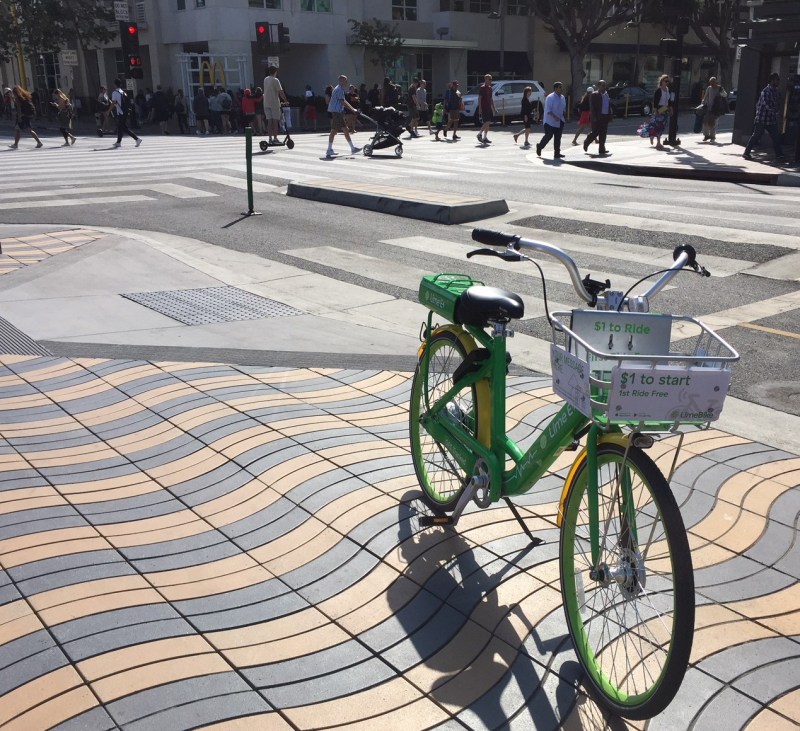Earlier today, the Los Angeles City Council unanimously approved pilot regulations governing shared mobility devices. These rules apply to e-scooters, e-bikes, and dockless bike-share.
The regulations have been working their way through city council committees since last December, when the main issue at hand was dockless bike-share. Since then, e-scooters have proved popular and have sparked a backlash from some quarters. In July, the council's Transportation Committee approved one version of the regulations. In August, the council's Public Works Committee approved similar regulations, with some additional amendments. Meanwhile a few councilmembers have pushed to ban e-scooters.
Today's full council meeting was not as contentious as might be expected, in part because the two most prominent shared mobility device critics - City Councilmembers Paul Koretz and Mitch Englander - were absent. Today's council debate was more about how to regulate e-scooters than whether or not to allow them.
Today, Joe Buscaino, David Ryu, and Mike Bonin tended to be the most supportive of e-scooters, though Bonin asserted that he sympathizes with both sides of the debate, hence the need for clear city regulations. Councilmember Mitch O'Farrell was the strongest critical voice, criticizing the e-scooter company Bird as a "bad operator." Council President Herb Wesson praised Councilmember Nury Martinez for her push to get shared mobility providers to serve low-income communities. Councilmembers Bob Blumenfield and Paul Krekorian expressed strong concerns about the affect the shared mobility devices might have on the city's liability for crashes and injuries.
In her testimony, City Transportation Department (LADOT) General Manager Seleta Reynolds revealed a few interesting factoids. Per Reynolds, it has been hard to get fleet size numbers from the companies that are currently operating. Reynolds said that Bird has claimed that their fleet size is 15,000 devices - well above the city's proposed cap on total fleet size. Reynolds also stated that, per a communication from Lime, e-scooter devices only last about four months.
The broad outlines of the regulations that the council approved are similar to parameters outlined at the May Transportation Committee meeting. Unlike the city of Santa Monica, there is no limit on the number of companies that will be allowed to operate in L.A. (Last week, Santa Monica approved only four operators to operate during its current pilot phase.) L.A. City's shared dockless device requirements include:
- Fees: Operators will pay a $20,000 annual fee, plus $130 per device (same as the city of Santa Monica.) For services in low-income areas, the per-device fee will be $39.
- Fleet Size: The initially permitted fleet size will be 3,000 devices, with up to 7,500 additional devices serving low-income areas. There was a push from Buscaino and Ryu to double the cap to 6,000, but this was rejected by the council. Bonin argued against any cap, which could undermine incentives for providing mobility in low-income areas.
- E-Scooter Speed: There had been a discrepancy over how fast e-scooters would be allowed to go - with 12 mph approved by the Transportation Committee, and 15 mph approved by the Public Works Committee. Today the council approved the 15 mph limit, which is the current maximum speed of Bird e-scooters.
- Data: Operators are required to report usage data to the city.
- Equity Provisions: In addition to the fleet size incentive above, operators must offer a way for people without smart phones to use the service, an option to pay with cash, and a low-income plan with reduced fares, as well as provide a multilingual mobile app and a call center.
- Liability: The council upped operators' general liability insurance requirements from $1 million to $5 million, and specified that indemnity provisions would apply to both companies and individual riders.
The regulations were approved by a unanimous 13-0 vote. They go into effect in 120 days. In the interim, dockless shared device companies (currently operating or not) will be allowed to operate up to 3,000 devices citywide under temporary permits - with the exceptions that there will be no temporary fleet size limits in Ryu's and Buscaino's districts, and that other councilmembers can exclude devices from specific areas inside their own district.






